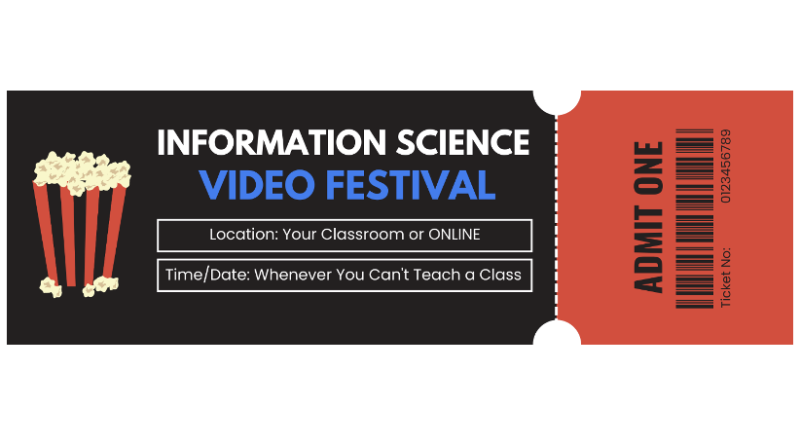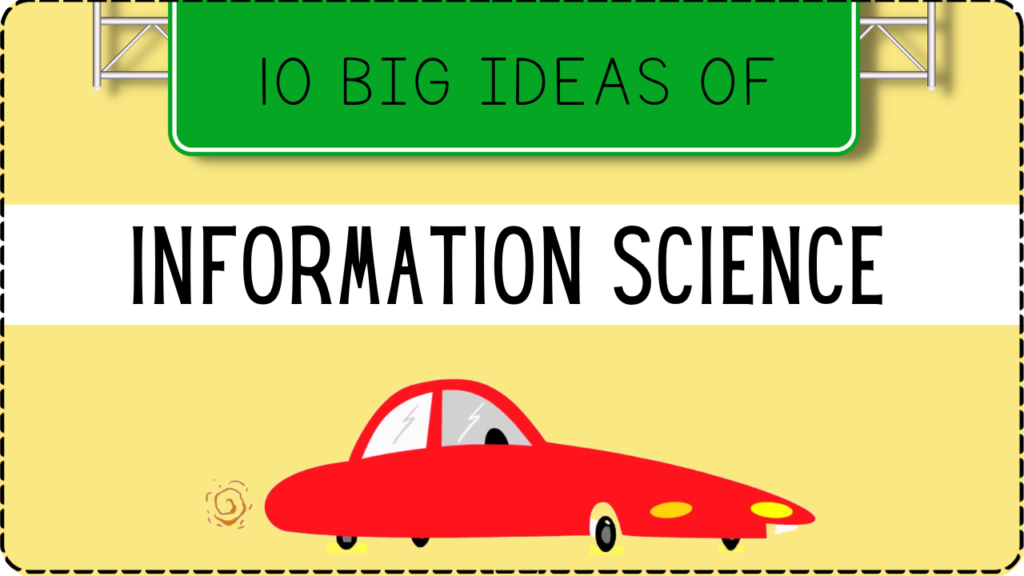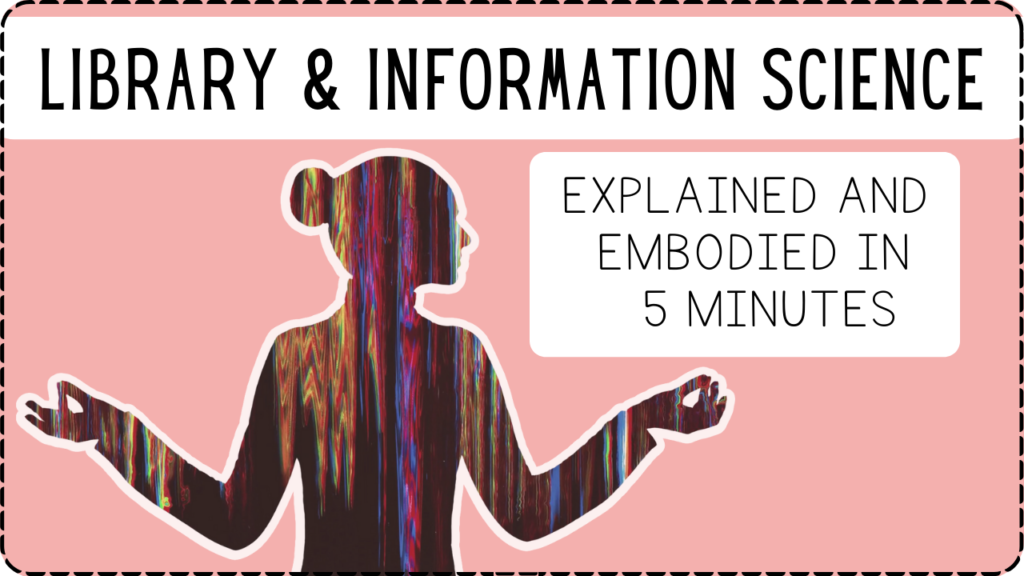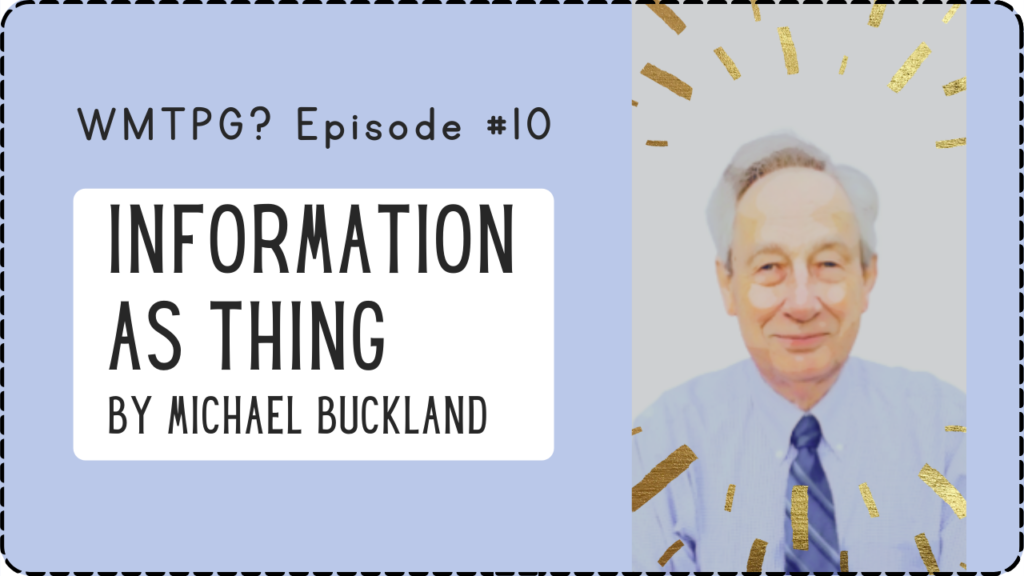Attending the ASIS&T Annual Meeting in London, England? Need to “Cover” a Class You are Teaching this Fall? Hold an Information Science Video Festival!
Attending the ASIS&T Annual Meeting in London, England?
Need to “Cover” a Class You are Teaching this Fall?
Hold an Information Science Video Festival!
Jenna Hartel
All educators occasionally wrestle with the matter of travel or other interruptions during the academic semester that take them away from the classroom. Even a single break in regularly scheduled gatherings with students can negatively impact learning momentum and participant enthusiasm. For me, this problem arises each time I attend the ASIS&T Annual Meeting, which usually falls in the middle of the fall term. In the past, I have had my Teaching Assistants “cover” class in my absence, but not everyone has such support. This posting offers a turnkey way for information science teachers to productively fill the gap: Hold an Information Science Video Festival! All the necessary steps and materials are provided, below.
What exactly am I talking about? To be clear: A selection of videos about information science, drawn from my YouTube channel, INFIDEOS (and beyond), can be assembled for viewing in-person to replace regularly scheduled class. Such a class can easily be hosted by a teaching assistant or a doctoral student in your community. Alternatively, a virtual video festival can occur synchronously or asynchronously, online. Currently, INFIDEOS contains 98 videos about information science and surely several resonate with your course topics. Calling this a “video festival” from the get-go increases student interest and excitement and does not make a last-minute or stop-gap impression. A worksheet (graded or as extra credit) can accompany the video festival to stimulate participation, discussion, and reflection on the content.
—INFIDEOS contains 98 videos about information science and surely several resonate with your course topics.—
I held an Information Science Video Festival for the first time in fall, 2022, when international conference travel interrupted the third week of my semester. Nevertheless, students convened (in a festive spirit) to engage information science through multimedia. Since my Teaching Assistant was also away from Toronto at the same conference, I enlisted a former doctoral student (now a PhD) to facilitate the session. Most of my 100 or so students were in the early weeks of their first year in a Master of Information program. Hence, videos were selected for their introductory nature, and their treatment of fundamental questions such as: What is information science? And what is information?
In addition to these three videos (which are some of the most popular at my channel), your own, custom-themed video festival could contain several Tiny Videos from INFIDEOS. Tiny Videos are short (<30 seconds) and designed to quickly pique curiosity by placing landmark ideas of information science into a dynamic, emotionally resonant form. They are like advertisements for scholarly ideas. A complete listing of Tiny Videos is shown below and the playlist is accessible, here. To illustrate, any course that touches upon information behavior could watch: INFORMATION POVERTY > INFORMATION ENCOUNTERING > INFORMATION GROUNDS > WILSON’S NESTED MODEL > INFORMATION BEHAVIOR OR INFORMATION PRACTICE > INFORMATION SEARCH PROCESS > EVERYDAY LIFE INFORMATION SEEKING > INFORMATION BEHAVIOR OF GATEKEEPERS > THE PRINCIPLE OF LEAST EFFORT > SMALL WORLDS > THE IMPOSED QUERY. Though this listing entails almost a dozen videos, the duration altogether is a only 6 minutes, and students can be warned to “fasten your seatbelt” in advance, given the rapid movement through concepts. Of course, at the festival, videos about information science can be sourced from beyond INFIDEOS, too.
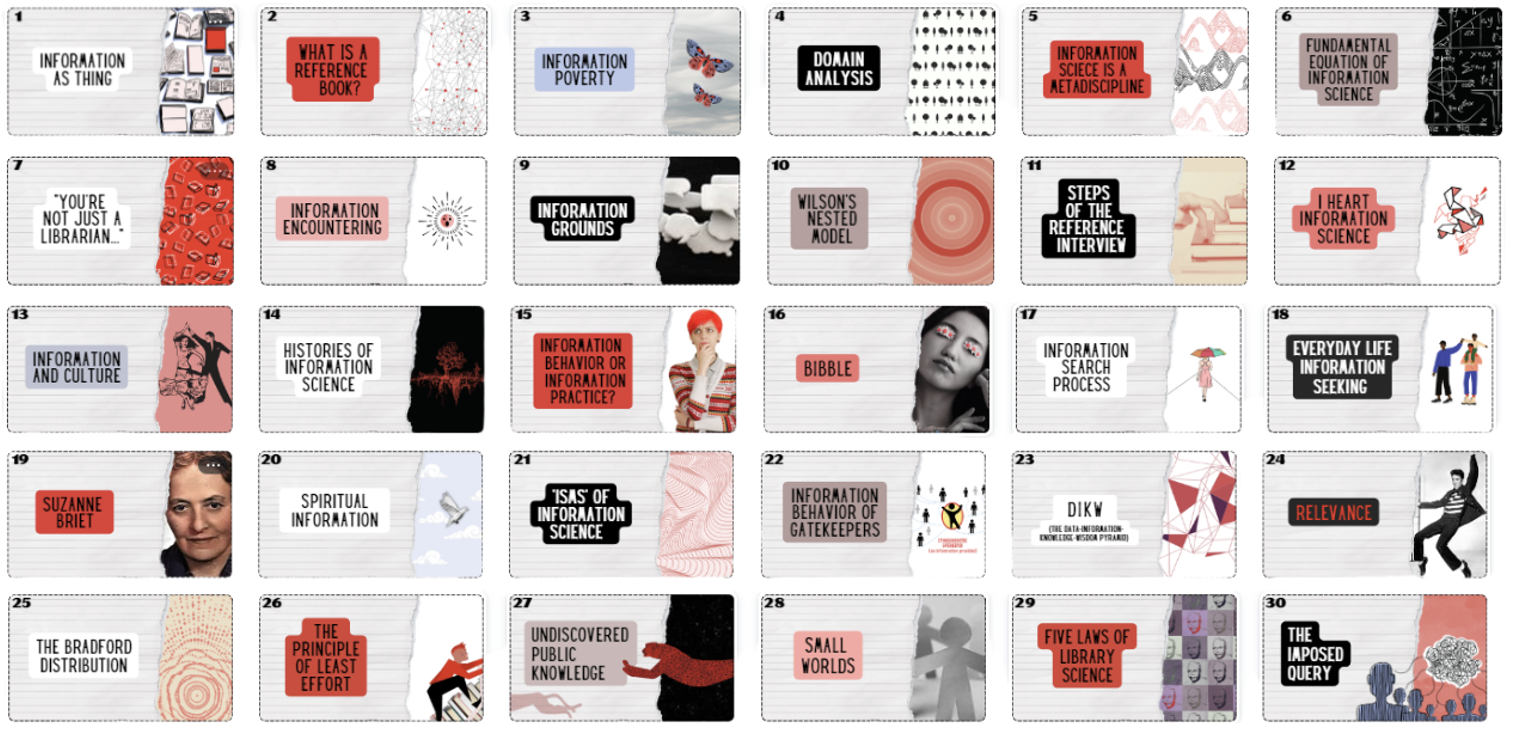
My own Information Science Video Festival in fall 2022 included a worksheet that was circulated at the start of the session. The worksheet was completed with a partner to encourage intra-class friendships. The worksheet was submitted at the end; counted for 5 points towards the final course grade; and was evaluated pass/fail. Importantly, the worksheet affirmed the importance of attending the film festival and paying attention to the videos. Above all, the worksheet was designed as a space for students to digest the content and to develop their own understandings. Two example questions from the worksheet appear below:
- This video, Information Science Road Trip, provides a history of ideas from information science. With your partner, discuss: Which ideas were familiar to you? Which ideas were new or surprising? Come to agreement on one idea that you both found interesting. In the space below, elaborate on contemporary applications, implications, or developments of that idea in today’s information environment.
- This video, Pictorial Metaphors for Information, surveys existing written conceptions of “information” by scholars of information science. It also presents an alternative visual conception of “information” as generated in arts-informed, visual research (Hartel, 2014; Savolainen & Hartel, 2016). With your partner, discuss your own conception of “information.” Then, in the space below, explain which pictorial metaphor from the video struck you as most compelling and why? Also, use the space provided to draw your own conception of “information” (metaphorical or otherwise).
As an alternative to the worksheet, students could be assigned to write a review of any video in the festival. Or, the videos could simply be followed by an open floor for questions and comments. For added fun, an in-person video festival could have snacks (popcorn!) and beverages; there could be a raffle, too. Students appreciate these small gestures, and with a thoughtfully planned video festival, learning will continue uninterrupted and the teacher will likely not be missed.
References
Hartel, J. (2014). An Arts-informed study of information using the draw-and-write technique. Journal of the American Society for Information Science and Technology, 65(7), 1349-1367.
Hartel, J. & Savolainen, R. (2016). Pictorial metaphors for information. Journal of Documentation, 72(5), 794-812.
Cite this article in APA as: Hartel, J. Attending the ASIS&T annual meeting in London, England? Need to “cover” a class you are teaching this fall? Hold an information science video festival! (2023, September 14). Information Matters, Vol. 3, Issue 9. https://informationmatters.org/2023/09/attending-the-asist-annual-meeting-in-london-england-need-to-cover-a-class-you-are-teaching-this-fall-hold-an-information-science-video-festival/
Author
-

I am an Associate Professor at the Faculty of Information, University of Toronto. As an interdisciplinary social scientist devoted to the field of Library and Information Science (LIS), I conduct research in three related areas: 1) information and the "higher things in life" that are pleasurable and profound; 2) visual and creative research methods; and 3) the history and theory of LIS. In the Master of Information program at the Faculty of Information, I mostly teach graduate students in the Library and Information Science concentration. Both my research and teaching aim to be an imaginative forms of intervention in the field of LIS, through unorthodox projects such as Metatheoretical Snowman, Welcome to Library and Information Science, and the iSquare Research Program. See my website at jennahartel.info or my YouTube Channel, INFideos.
View all posts




